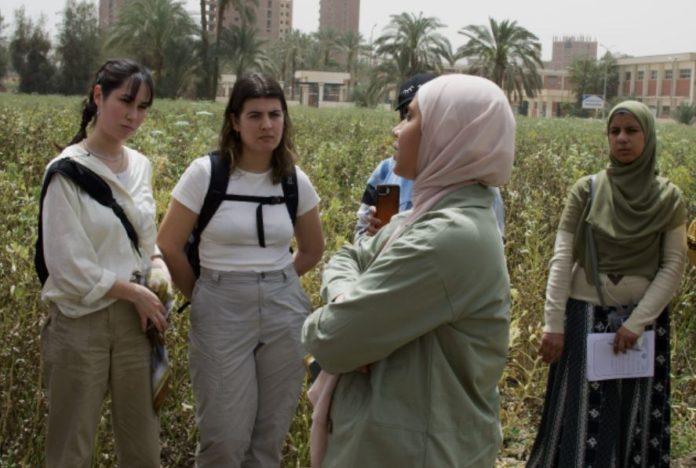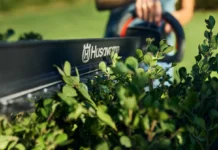As part of an exchange programme, students from both the department of Soils and Water at the Faculty of Agriculture in Assiut University, Egypt and the Earth Sciences track at the Gladsaxe Gymnasium High School in Copenhagen, Denmark, gathered for four days in a field trip in Kharga Oasis depression in Western Desert.
The trip is the first part of a two-week project organized by the Danish-Egyptian Dialogue Initiative (DEDI) to promote new and enhanced networks between Danish and Egyptian youth and academia in the discipline of geoscience at university/high school levels.
The project is designed to bring together 20 students from both countries, between the age of 18 and 25, to exchange knowledge on specific challenges and solutions in the fields of sustainable agriculture, climate change, and green transformation through organized study trips in both Egypt and Denmark.
According to DEDI, the two-week exchange aims to enable students to gain intercultural competences and learn about the people and customs of the hosting country. As for the first part of the project, the Danish students studied solutions and challenges with agricultural development around Assiut and the New Valley and have seen the Geological Eastern Scarf of the Western Limestone Plateau, the Western Desert, Kharga Oasis, as well as the Western Dakhla Oasis.
Ecological farms
In the second part of the project, the Egyptian students will be exposed to ecological farms in Værløse in Denmark, the Danish Hydrological Institute, Northern Jylland, the factories of the Grundfos pumps, as well as restoration of former farmlands at Skjern Stream.
“I’m here in Egypt to gain new knowledge and exchange culture with new people,” she said. Simone believes that the trip fits her ambitions, particularly that she is not very interested in agriculture but they have seen a lot of landforms which are related to her future plans to join the Copenhagen University to study physical geography.
“The experience of having an Egyptian roommate was stressing in the beginning because there was a difficulty in understanding each other and I was a little frustrated, but I think today (the third day of the trip) we wiped it out, we talked a lot about how to say different things in Arabic and I also taught her how to say different things in Danish. We found common ground together and we became kind of friends,” she noted.
Sahar Mostafa, the Teaching Assistant at the Department of Soils and Water, Assiut University, said that her participation in the programme was important for several reasons. She said: “The subject has more than one dimension. First, I will be able to see the capabilities provided by the programme that are not available to me, so it will lead me to different goals. Secondly, there is the possibility of obtaining a scholarship to study a master’s or doctorate or even a project that will help me in my work.”
She continues: “There can also be an exchange and the presence of an external supervisor in my studies, as well as an exchange of cultures, getting to know a different society and forming new relationships.”
About her Danish roommate, Sahar described her as very nice and friendly. “She had some questions about the hijab (veil) and whether I was obligated to it, and I explained to her that I am veiled because I believe in it and that it is from the Islamic religion and no one forced me to do so. We had conversations about the Qur’an, and about the lifestyles in both Denmark and Egypt. It was a very good and useful experience.”
One of the Egyptian students joining the project is Martina Barzy, a student in the Department of Soils and Water at Assiut University. She described the project as an unmissable opportunity on both the academic and cultural levels. This was the first time for Marticna to communicate with foreigners directly. She also found the field visit very useful for her to apply what she studied in theory.
“The programme is very new and useful, but I was hoping for more intensification, seeing more places, such as groundwater wells, and getting a closer look at some of the areas and phenomena that we passed by bus. I had hoped that we would visit many places inside Assiut that the Danish students could be introduced to,” Martina added.
Hasnaa Tariq (21 years old) a student in the second grade, at the Department of Soils and Water, Faculty of Agriculture, Assiut University, said that she was keen to participate in the programme to learn about a new culture and benefit from the fieldwork that the programme provides.
“The programme is very useful for me, as it will provide me with a new experience in visiting Denmark and learning about new environments and natural phenomena. It will be my first time to travel outside Egypt, which will open a new horizon for me in getting to know Danish society, which may facilitate the opportunities for me to get the opportunity to study a master’s or doctorate abroad,” she explained.








